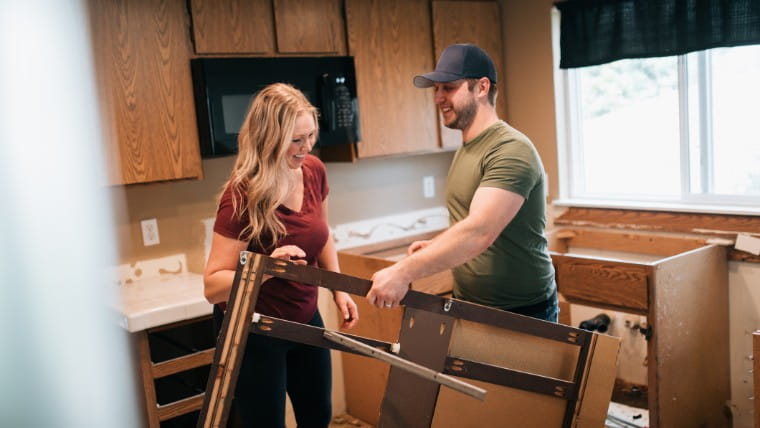What's a HELOC and When Should You Use One?

Homeowners who hit a financial snag or want to take on an expensive project, may have the option of using their home as a piggy bank. With a home equity line of credit (HELOC), you can borrow against the equity you’ve built in your home — the difference between the home’s value and your outstanding mortgage balance.
A HELOC is a type of second mortgage. But instead of getting the full loan amount upfront, you’ll open a line of credit that you can borrow against multiple times. It can be a helpful option if you anticipate needing to take out multiple loans in the coming years. Or, if you want access to a line of credit in the future without the requirement of borrowing the money right now. However, HELOCs also aren’t always the best way to go.
How do HELOCs work?
With a HELOC, you can borrow up to a certain percentage of your home’s value (generally, 85% to 95%), minus what you currently owe on your mortgage. For example, if your home is worth $300,000, you may be able to get a line of credit for 90% of that, or $270,000. But if you still owe $200,000 on your mortgage, the line of credit will be limited to $70,000.
Your HELOC will usually have two distinct periods — a draw period and a repayment period. The specific lengths will depend on your loan, but draw periods tend to last around five to 10 years, while the repayment period may be 15 to 20 years.
During the draw period, you can borrow against your line of credit (i.e., take a draw) and make interest only payments. It’s like a credit card in that you can free up your credit limit by paying down your balance, and borrow against your credit line multiple times as long as you don’t go over the limit. In fact, your HELOC may come with a card and checks you can use to access the money.
Once the draw period ends, you’ll have to make larger payments to repay the principal balance of your outstanding loan plus interest over the repayment period. Or, with some HELOCs, the entire amount is due once the draw period ends.
How to get a HELOC
You can apply for a HELOC from different lenders — you don’t have to use your original mortgage lender. As with other types of loans, your creditworthiness and debt-to-income ratio can impact your ability to qualify, along with the rates and terms you receive.
Similar to other mortgages, lenders may charge closing costs to have your property appraised and to open the line of credit. There may also be annual fees to keep the credit line open, a transaction fee when you take a draw, inactivity fees if you don’t use the credit line, and early closure fees.
You should research your options as the loan amounts, fees, interest rates, and other important terms can vary depending on where you get your loan. During economic downturns, some lenders may also stop offering HELOCs or make the requirements stricter, which can make it more difficult to find a good offer.
When should you use a HELOC?
If you’ve built equity in your home and can qualify for a HELOC, it may be one of the best options when:
- You need to borrow a lot of money: By using your home as collateral, you may qualify for a larger loan than you could get with an unsecured personal loan or line of credit.
- You’re using the money to improve your home: If you use the money from a HELOC to substantially improve your home in a way that adds to its value, such as adding a new room, the interest on the loan may be tax deductible. Repairs and maintenance don’t count.
- You need to make a series of payments: A line of credit can be helpful if you’re going to make progress payments to a contractor, tuition payments, or other types of ongoing payments. If you need all the money at once, look into an installment loan, such as a home equity loan or personal loan.
Why a HELOC isn’t always the right choice
But sometimes, a HELOC could be riskier or more expensive than other types of loans that you can use to meet your needs. Keep in mind:
- You’re using your home as collateral: If you can qualify for similar or better terms with an unsecured loan, such as a personal loan from an online lender, then you might not want to get a HELOC. Because you’re using your home as collateral, you risk losing the home if you can’t afford the payments in the future.
- There could be many fees: Part of the comparison should be the fees you’ll need to pay to open and use a HELOC. While other loans might have some fees, unsecured loans don’t have closing costs, and a home equity loan (HEL) generally won’t have ongoing fees.
- Your costs could quickly rise: Many HELOCs have variable interest rates. The changing rates can impact how much interest accrues and your monthly payments, making it difficult to budget. You’ll also want to beware of when your draw period ends and how much your repayment period payments will be, or if you’ll owe a large balloon payment.
While a HELOC can be a helpful tool, particularly when you can borrow against your home to increase the value (and comfort) of your home, it’s not a one-size-fits-all solution. The best way to access affordable loan and credit products is to improve your overall financial health. For a free, confidential review of your financial situation, credit counseling is available 24/7, online and by phone.
Considering a HELOC to repay credit card debt? Do Debt Differently with MMI. Our debt repayment plans can have you out of debt in as little as 24 months.
















